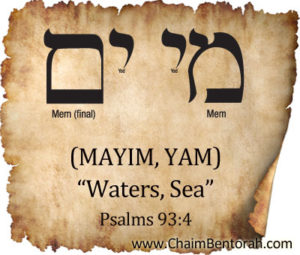WORD STUDY – WATERS, SEAS -Mayim, Yam מי, ימ
Psalms 93:4: “The Lord on high is mightier than the noise of many waters, yea than the mighty waves of the sea.”
 The sea was a place of terror to the landlocked Jewish people. Fishermen were the ironworkers of their day. If you live in the city you probably saw the ironworkers constructing skyscrapers walking narrow beams like a Sunday stroll. If I think of fearless men I think of these ironworkers. That is what people thought of the fishermen in the ancient world. Although the Jews rejected any polytheistic mythology, they still knew the stories and when Jesus walked on the waters during a stormy sea, at night and calmed the storm, he was declaring Himself the master God, who wielded more power than Zeus or Neptune (Dagon), for not even these phony gods could control the mighty seas. The writer of this Psalm is declaring in beautiful poetry that the God Jehovah has all of these phony, two-bit, penny Annie, wannabe gods beat by many miles.
The sea was a place of terror to the landlocked Jewish people. Fishermen were the ironworkers of their day. If you live in the city you probably saw the ironworkers constructing skyscrapers walking narrow beams like a Sunday stroll. If I think of fearless men I think of these ironworkers. That is what people thought of the fishermen in the ancient world. Although the Jews rejected any polytheistic mythology, they still knew the stories and when Jesus walked on the waters during a stormy sea, at night and calmed the storm, he was declaring Himself the master God, who wielded more power than Zeus or Neptune (Dagon), for not even these phony gods could control the mighty seas. The writer of this Psalm is declaring in beautiful poetry that the God Jehovah has all of these phony, two-bit, penny Annie, wannabe gods beat by many miles.
The ancients had a far greater terror of the seas than we have today and if our God is mightier than the most terrifying thing on earth, what do we have to fear. But there is a treasure buried in the depths of this sea. “The Lord is mightier than the noise of many mayim or waters and mightier than the waves of the yam or sea.” The root words of both water and sea are the rare cases where it is dual and triliteral. Waters is spelled mem, yod and seas are in reverse yod, mem. Each has a numerical value of 50. The numerical value of the word for you are mine is also 50. That was an old saying of the ancient seaman who ventured out onto the seas, he knew his fate belonged to the sea. They believed the sea was saying to them: You are mine.
In Matthew 14 those words must have echoed in Peter’s ears when he saw Jesus walking on the water-treading over the territory of the feared gods. When he saw Jesus walking on the water and in the midst of the storm I think he might have thought of those words; You are mine. Jesus was showing that he was overpowering the mighty waters and was saying the terror of the sea cannot claim you because you are mine.
Then Peter asked if he could come. In the Greek, the word is elithe. Jesus spoke Aramaic and the word used in the Peshitta is etha which means to produce or to bring forth fruit. Perhaps Peter was asking if he could show the fruit of his faith. Jesus then replied etha, “Show me the fruit or produce of your faith.” Peter made it only so far before his faith failed. It the Greek and English it sounds like Jesus scolded him: “Oh you of little faith, why did you doubt.” But in the Aramaic, I read it differently. The word little is zeora which means to be young, immature. So Jesus was only saying: “It is because your faith is still young which is why you doubted.” I see Jesus encouraging Him even more because the Greek word that was used for Come elithe is sometimes used in the Septuagint for halak. Halak = 50 + 5 (grace). 50 is also the number for faith. The grace of God (5) without faith (50) is of no value as Peter quickly learned.







Recent Comments